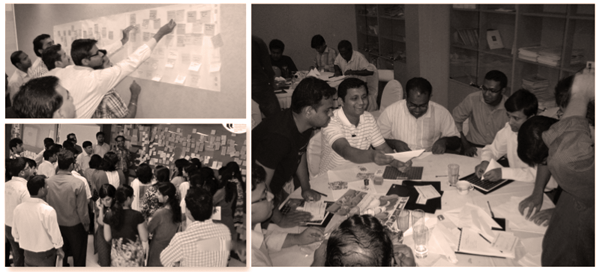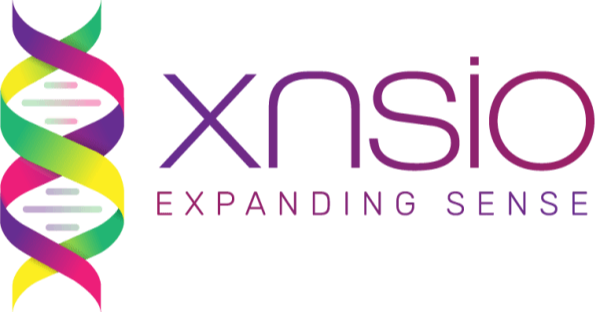Better understanding of Agile way-of-working
A Real-World Look at Agile in Action
During this session we’ll try and highlight some of the core issues with tradition PMI and CMMI based software project management process. We’ll demonstrate how Agile is different. We’ll achieve this through simulation, discussion and sharing first hand experiences.
Key takeaways and practical knowledge

At the end of this training the team will have:
3-Day Course Breakdown
- Introduction and Icebreaker
- Waterfall to Agile Demo - A small activity to highlight the differences between waterfall and Agile/Lean thought process
- Overview of Agile- Origin and Rationale Behind it!
- Overview of eXtreme Programming
- XP Principles
- Continuous Integration
- Refactoring
- Pair Programming
- Collective Code Ownership
- Overview of Scrum
- Scrum Ceremonies
- Scrum Artifacts
- Scrum Roles
- Agile Project Lifecycle
- Major Phases
- Product Vs Services Lifecycle
- Project Inception
- Agile Releasing Planning
- Iteration Planning and eXtreme Programming Planning Game
- Up-to-date discussion on tracking and measurements
- Informative work spaces and information radiators
- Slack-Is it Good?
- Agile Testing - Role of testing on Agile Projects
- Distributed Development Better Practices
- Evolution of Team Interaction Models - An experience report on scaling Agile
- Discussion - On performance appraisal and other organizational issues that can surface
- Agile Myth Busters - We bust some Agile myths
Day One
Day Two
Day Three
Benefits
All of our courses offer following benefits:
- Unlimited access to course materials, sample projects and code examples with relevant tools
- Low participant-to-instructor ratio
- Heavy focus on hands-on learning experience
- Live demos and real-world examples
- Interactive activities/simulations to help understand the essence and concepts
- Open discussion and dynamic format
- Customizable
Post training, if your team needs help, we’ll be happy to assist your team.

Instruction Method, Audience & Prerequisites
Method of Instruction
Transfer %
Target Audience
Course Level
Course Prerequisites
- Working experience in the project
- Highly Recommended: basic understanding of the life-cycle of software projects
Want to enroll or customize a training for your team?
Contact us to get started.
Training Details
Pricing
- Trainer Fee: Rs. 1,70,000 (~2000 USD) per day
- GST: Additional 18% GST applicable on all trainings delivered in India
- Expenses: Travel, accommodation and other expenses to be paid by the company
- No. of Participants: All our training have a cap of max 20 participants per training
Contact Details
If you are interested in any of the trainings listed here or interested in customizing these trainings to your needs, please contact us.
Timings
9:00 AM – 6:00PM
These trainings can also be conducted on a weekend if that works better for your team.
General Requirements
- HDMI projector (1024x768 minimum) & Projector screen
- 1 White board & Dry erase markers.
- Cluster seating with 5-6 people on each table.
- 1 Flip chart with the stand and marker pens for each table.
- Notepad and Pen for each participant.
- Ample room for students in terms of room size and set up.
- For Dev trainings: at least one powerful workstation between two programmers.
- HDMI projector (1024x768 minimum) & Projector screen
- 1 White board & Dry erase markers.
- Cluster seating with 5-6 people on each table.
- 1 Flip chart with the stand and marker pens for each table.
- Notepad and Pen for each participant.
- Ample room for students in terms of room size and set up.
- For Dev trainings: at least one powerful workstation between two programmers
General Requirements
To ensure a successful workshop, we require the following facilities:
- HDMI projector (1024×768 minimum) & Projector screen
- 1 White board & Dry erase markers
- Cluster seating with 5-6 people on each table
- 1 Flip chart with the stand and marker pens for each table
- Notepad and Pen for each participant
- Ample room for students in terms of room size and set up
- For Dev trainings: at least one powerful workstation between two programmers
During this session we’ll try and highlight some of the core issues with tradition PMI and CMMI based software project management process. We’ll demonstrate how Agile is different. We’ll achieve this through simulation, discussion and sharing first hand experiences.
There are lots of myths about Agile that exist out there and this session will help clarify some of those as well. At the end of this session, you might be able to compare your current process and see how you might want to adapt that to be more agile.
Learning Outcome
At the end of this training the team will have:
- Better understanding of Agile way-of-working
- Clarity about XP and Scrum practices
- Insights about Agile myths
- Deeper knowledge about Agile Testing and Distributed Development practices
Course Outline
Day One
Introduction and Icebreaker
Waterfall to Agile Demo
A small activity to highlight the differences between waterfall and Agile/Lean thought process
Overview of Agile- Origin and Rationale Behind it!
Overview of eXtreme Programming
- XP Principles
- Continuous Integration
- Refactoring
- Pair Programming
- Collective Code Ownership
Overview of Scrum
- Scrum Ceremonies
- Scrum Artifacts
- Scrum Roles
Day Two
Agile Project Lifecycle
- Major Phases
- Product Vs Services Lifecycle
- Project Inception
Agile Releasing Planning: The outside in approach
Iteration Planning and eXtreme Programming Planning Game
Up-to-date : discussion on tracking and measurements
Informative work spaces and information radiators
Slack-Is it Good?
Day Three
Agile Testing
Role of testing on Agile Projects
Distributed Development Better Practices
Evolution of Team Interaction Models
An experience report on scaling Agile
Discussion
On performance appraisal and other organizational issues that can surface
Agile Myth Busters
We bust some Agile myths
Training Details
Method of Instruction
We use a Socratic method for training that involves a 100% hands-on workshop with interactive dialogues and demonstrations.
Transfer %
Knowledge: 50%, Skill-Building: 50%
Target Audience
Team members and other project stakeholders
Course Level
Advanced
Course Prerequisites
- Working experience in the project
- Highly Recommended: basic understanding of the life-cycle of software projects
General Requirements
- HDMI projector (1024×768 minimum) & Projector screen
- 1 White board & Dry erase markers
- Cluster seating with 5-6 people on each table
- 1 Flip chart with the stand and marker pens for each table
- Notepad and Pen for each participant
- Ample room for students in terms of room size and set up
- For Dev trainings: at least one powerful workstation between two programmers




